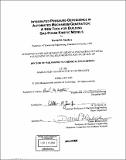Integrated pressure-dependence in automated mechanism generation : a new tool for building gas-phase kinetic models
Author(s)
Matheu, David M. (David Michael), 1974-
DownloadFull printable version (12.57Mb)
Other Contributors
Massachusetts Institute of Technology. Dept. of Chemical Engineering.
Advisor
William H. Green, Jr.
Terms of use
Metadata
Show full item recordAbstract
A host of vital, current, and developing technologies, such as pyrolysis, thermal cracking, partial oxidation, and high-efficiency combustion engines, involve complex, gas-phase chemical mechanisms with hundreds of species and thousands of reactions. Building complete, explicit chemical models by-hand for these systems is exceedingly difficult. The bias and intuition of the developers figure strongly in the resultant mechanism, causing important but unanticipated pathways to be ignored, and useless pathways to be included. Thus many chemists and engineers have tried artificial intelligence software tools, or "automated mechanism generators", to build large chemical mechanisms systematically. These tools employ graph-theory algebra, and "rate rules" - estimates of rate constants for classes of reactions - to construct automatically all the possibly important reactions and species for a given set of conditions. All of these tools have been severely hampered by their inability to capture the effects of pressure-dependence and falloff - even though these effects are important in almost every gas-phase system of interest to engineers and designers. Pressure-dependent reactions cannot be included using simple rate rules. Until now they presented an unresolved quandary for automated mechanism generators. This work presents the first automated method for including pressure-dependent reactions generally and systematically, on-the-fly, in computerized mechanism generation. (cont.) The approach includes in the mechanism only those pressure-dependent pathways important for the conditions of interest, but can find any potentially important pressure-dependent reaction. It works by building partial pressure-dependent reaction networks, step-by-step, in harmony with a rate-based termination criteria which rationally controls overall mechanism size. It uses a fast, approximate method, the Quantum-Rice-Ramsperger-Kassel/Modified-Strong-Collision (QRRK/MSC), to predict rate constants k(T,P) employing only high-pressure-limit rate rules, pressure-dependent network structure, and heat capacity estimates. The error incurred by screening the pressure- dependent networks to include only important sections is small and bounded. Successful applications to various systems, including reactions through cycloalkyl intermediates, are presented. Application of this tool to methane pyrolysis revealed a new, unexpected mechanism. It explained the decades-old mystery of methane autocatalysis at low conversion, a phenomenon which had defied all "by-hand" attempts at mechanism development. Such work hints at the predictive power inherent in the next generation of automated mechanism builders.
Description
Thesis (Ph. D.)--Massachusetts Institute of Technology, Dept. of Chemical Engineering, 2003. Includes bibliographical references.
Date issued
2003Department
Massachusetts Institute of Technology. Department of Chemical EngineeringPublisher
Massachusetts Institute of Technology
Keywords
Chemical Engineering.